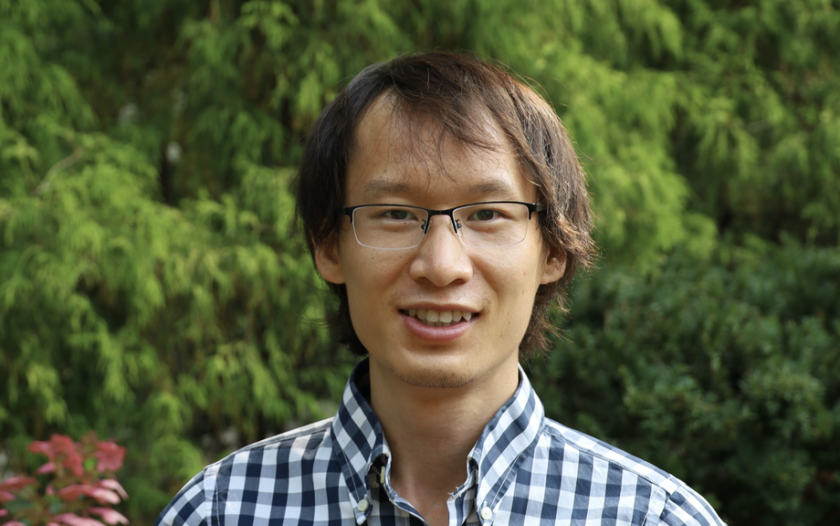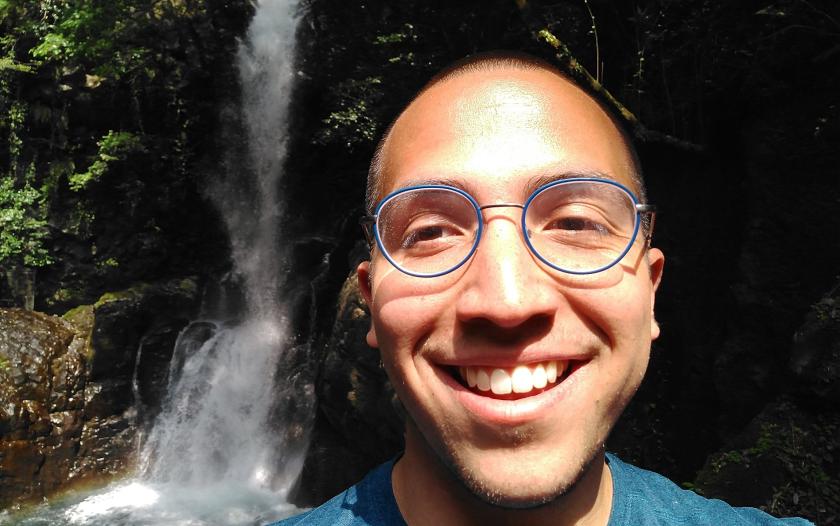Stanford Impact Labs Sponsors Postdocs to Work on Racial and Gender Bias, Polarization, and Governance

Four graduating PhD students join Stanford’s community this fall as part of our inaugural Stanford Impact Labs Postdoctoral Fellowship. Malissa Alinor (University of Georgia, Sociology), Marbella Eboni Allen (Rice University, Sociology), Max Hui Bai (University of Minnesota, Psychology) and Carlos Schmidt-Padilla (UC Berkeley, Political Science) will work with impact-focused research labs across campus to address some of the most challenging social problems: racial and gender bias in the workplace; political polarization in the United States; and poverty and violence in Central America.
Racial and gender bias in the workplace

Marbella Eboni Allen is working with the VMware Women’s Leadership Innovation Lab on racial and gender inequality in the workplace.
Under the direction of Shelley Correll, professor of sociology and organizational behavior and associate director of Stanford Impact Labs, Malissa Alinor and Marbella Eboni Allen join the VMware Women’s Leadership Innovation Lab, a collaborative community working to understand barriers faced by women of different racial and ethnic backgrounds in the workplace. The lab implements and evaluates interventions to increase women’s representation, persistence, and inclusion in male and white dominated learning and work environments.
“I am drawn to this lab for its innovative mission to bridge the gap between academic gender scholarship and practice,” says Allen. Her own research underscores the need for institutions to actively foster a sense of belonging among women, especially women of color, in the workplace. For example, she has found that Black women in predominantly white professional workplaces strategically deploy alienation from the self as a strategy for excelling in those workplaces. “Without attention to how race shapes how women of color experience and navigate professional workplaces as double minorities, progress toward gender equality will continue to be thwarted.”
"I am drawn to this lab for its innovative mission to bridge the gap between academic gender scholarship and practice. Without attention to how race shapes how women of color experience and navigate professional workplaces as double minorities, progress toward gender equality will continue to be thwarted." — Marbella Eboni Allen
Allen says collaborating with like-minded scholars in the VMware Women’s Leadership Innovation Lab will “allow more of the necessary work to be done to address systemic challenges faced by women and people of color in the workplace.”

Malissa Alinor’s doctoral research also focuses on the impact of bias in the workplace. She has used experimental research to assess how competency-based micro-aggressions affect the behaviors and emotions of employees. She will continue this research by exploring the intersection of gender and race in how individuals experience micro-aggressions.
Alinor has also investigated the impact of organizational sexual harassment policies on gender beliefs and men’s willingness to work with women. “Because the workplace is a site where many women and people of color report experiencing discrimination,” Alinor says, “how organizations buffer against or compound negative worker outcomes is an important component of my research.”
Alinor says “being able to partner directly with organizations during my postdoctoral fellowship to design and test interventions that reduce workplace inequality is a unique opportunity, and I am excited to engage with this community of scholars.”
"Being able to partner directly with organizations during my postdoctoral fellowship to design and test interventions that reduce workplace inequality is a unique opportunity, and I am excited to engage with this community of scholars." — Malissa Alinor
Polarization in the United States
Max Hui Bai joins Robb Willer, professor of sociology, psychology, and organizational behavior, and his research team at the Polarization and Social Change Lab who are exploring how to reduce polarization in the United States. The lab’s broader research agenda on political polarization includes topics of framing, messaging, and persuasion; political dimensions of inequality; social movement mobilization; and online political behavior.
Bai studies the social cognitive processes that undergird inter-group relations and ideology. His research explores how people think about society as it changes in an inter-group context, including how people react to the numerical decline of white populations, the growth of Muslim populations, and how that can shape mass political behaviors.

In other projects he has studied inequalities between and within minority groups in relation to how we process information, such as COVID-19 misinformation. His working hypothesis: “Our symbolic identities can critically determine how we think about society. Oftentimes, grievances and concerns behind inter-group conflicts, including the clashing of political ideologies, can be more symbolic than realistic. If we can find ways to address and alter symbolic meanings and mechanisms, we may be able to identify new approaches to address the deep political hostilities we’re experiencing.”
"Good theories should be informed by practice and used in practice," says Bai. "I am particularly excited for the opportunity to work alongside the Polarization and Social Change Lab with leaders in government, business, and nonprofits.”
"Good theories should be informed by practice and used in practice. I am particularly excited for the opportunity to work alongside the Polarization and Social Change Lab with leaders in government, business, and nonprofits." — Max Hui Bai
Poverty and violence in Central America
Carlos Schmidt-Padilla joins the Poverty, Violence, and Governance Lab which generates action-oriented research to provide solutions to lawlessness and violence and enhance the transparency and democratic accountability of law enforcement and criminal justice systems. The lab, led by Beatriz Magaloni-Kerpel, professor of political science, will be launching a new project on the analysis of temporary worker programs in Oregon and their promise to simultaneously combat poverty and violence in the respective Central American home countries. Schmidt-Padilla will be co-investigating.

Born and raised in El Salvador, Schmidt-Padilla spent much of his time as a doctoral student in Central America. His dissertation explores the impacts of gang violence and the parallel militarization of police on administrative corruption, citizen security, and institutional strength in El Salvador and other Latin American countries. “I share the POVGOV Lab’s commitment to public policy-minded and collaborative research,” said Schmidt-Padilla, who brings experience engaging policymakers and evaluating public policy interventions related to crime and human capital. “I’m also eager to grow as a scholar, benefitting from the mentorship of Professor Magaloni-Kerpel and my colleagues at POVGOV and Stanford, more broadly.”
“Although social science scholars have increasingly begun paying attention to issues surrounding crime—and its implication for democracy and human rights—much remains to be understood, particularly in Latin America," says Schmidt-Padilla. "As a member of the Poverty, Violence, and Governance Lab, I hope to contribute to the growth and evolution of this line of research and its potential contributions to policy and action.”
"Although social science scholars have increasingly begun paying attention to issues surrounding crime—and its implication for democracy and human rights—much remains to be understood, particularly in Latin America. As a member of the Poverty, Violence, and Governance Lab, I hope to contribute to the growth and evolution of this line of research and its potential contributions to policy and action." — Carlos Schmidt-Padilla
Stanford Impact Labs is excited to launch this program, which is designed to provide postdoctoral fellows with the opportunity to engage in collaborative, impact-focused research in a way that contributes to the research goals of the lab in which they are working, strengthens their own scholarship, and ultimately drives forward new partnerships and policy insights to address pressing social problems. We are fortunate to have four amazing scholars whose research and motivations are so well aligned with these ambitions. Stanford Impact Labs is also working to elevate the scientific insights of the postdoctoral fellows and the participating research labs, and elevate public impact scholarship more broadly, growing the community and pipeline of scholars dedicated to tackling social problems through science.
Stanford Impact Labs is looking for new research teams and labs to host future postdoctoral fellows. For more information, please sign up for our affiliate network.
